

(1) Own Summary. (2) Statistics Singapore - Elderly, Youth and Gender Profile. (3) Elderly profile in Singapore. (4) Elderly to make up almost half of S’pore population by 2050: United Nations. SINGAPORE – The Republic’s population size is expected to reach 6.34 million in 2030, based on projections from the United Nations (UN) released this year.

By then, there will be 806,000 people under 15 years old, and 1.8 million people who are aged 65 years or older - making up about 28 per cent of the total population. The numbers will reach 722,000 and 3.08 million, respectively, out of a total population of 6.58 million by 2050. This means that in about three decades, almost half (47 per cent) of Singapore’s total population will be at least 65 years old. According to the UN’s 2017 World Population Ageing report, Singapore’s population stood at 5.71 million as of this year, consisting of 855,000 people under the age of 15, and 886,000 people aged 65 and above. On Friday (Dec 8), Singapore’s Prime Minister’s Office Strategy Group disputed the UN numbers for 2017, which it said differed from official statistics.
(1) Own Summary. (2) Stress in the Elderly. We all need to face different kinds of mental stress in various stages of life.
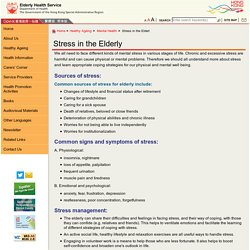
(3) Seniors and Stress - The American Institute of Stress. Seniors and StressWilliam Heckman2019-08-22T07:33:31-05:00 Because the immune system’s defense mechanisms become impaired as we grow older, our ability to resist infection progressively declines.
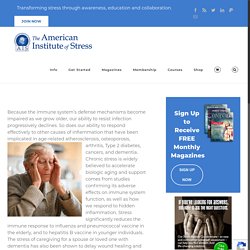
So does our ability to respond effectively to other causes of inflammation that have been implicated in age-related atherosclerosis, osteop orosis, arthritis, Type 2 diabetes, cancers, and dementia. Chronic stress is widely believed to accelerate biologic aging and support comes from studies confirming its adverse effects on immune system function, as well as how we respond to hidden inflammation. Stress significantly reduces the immune response to influenza and pneumococcal vaccine in the elderly, and to hepatitis B vaccine in younger individuals. (4) Social, Psychologic, and Biologic Stresses Facing the Elderly. (1) Own Summary.
(2) Depression in older people. How stress affects seniors, and how to manage it. Exercise, breathing techniques, and medication can help you manage stress as you get older.
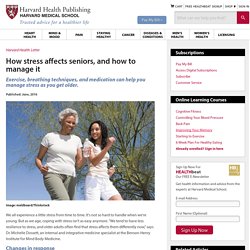
Image: moldboard/Thinkstock We all experience a little stress from time to time. It's not so hard to handle when we're young. But as we age, coping with stress isn't as easy anymore. "We tend to have less resilience to stress, and older adults often find that stress affects them differently now," says Dr. (1) Own Summary. (2) Stress and Depression Among the Elderly. (1) Own Summary. (2) Stress and Depression Among the Oldest-Old: A Longitudinal Analysis.
(1) Own Summary. (2) Social Support and Adaptation to Stress by the Elderly. (1) Own Summary. (2) Functional decline in the elderly evidence for direct and stress buffering protective effects of social interactions and physical activity. (1) Own Summary. (2) Tai chi: A gentle way to fight stress. Tai chi: A gentle way to fight stress Tai chi helps reduce stress and anxiety.
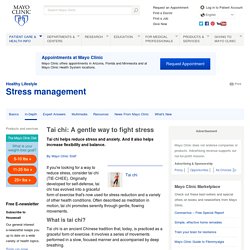
And it also helps increase flexibility and balance. By Mayo Clinic Staff If you're looking for a way to reduce stress, consider tai chi (TIE-CHEE). Originally developed for self-defense, tai chi has evolved into a graceful form of exercise that's now used for stress reduction and a variety of other health conditions. What is tai chi? Tai chi is an ancient Chinese tradition that, today, is practiced as a graceful form of exercise. Tai chi, also called tai chi chuan, is a noncompetitive, self-paced system of gentle physical exercise and stretching.
Tai chi has many different styles. Tai chi is different from yoga, another type of meditative movement. Who can do tai chi? Tai chi is low impact and puts minimal stress on muscles and joints, making it generally safe for all ages and fitness levels. You may also find tai chi appealing because it's inexpensive and requires no special equipment. (3) The health benefits of tai chi. Tai chi is often described as "meditation in motion," but it might well be called "medication in motion.

" There is growing evidence that this mind-body practice, which originated in China as a martial art, has value in treating or preventing many health problems. And you can get started even if you aren't in top shape or the best of health. In this low-impact, slow-motion exercise, you go without pausing through a series of motions named for animal actions — for example, "white crane spreads its wings" — or martial arts moves, such as "box both ears. " As you move, you breathe deeply and naturally, focusing your attention — as in some kinds of meditation — on your bodily sensations.
(1) Own Summary. (2) Counseling the Elderly. The continued growth of the elderly population in society has placed renewed focus on providing older adults with quality mental health care.
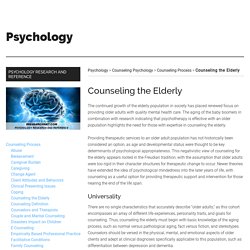
The aging of the baby boomers in combination with research indicating that psychotherapy is effective with an older population highlights the need for those with expertise in counseling the elderly. Providing therapeutic services to an older adult population has not historically been considered an option, as age and developmental status were thought to be key determinants of psychological appropriateness. This negativistic view of counseling for the elderly appears rooted in the Freudian tradition, with the assumption that older adults were too rigid in their character structures for therapeutic change to occur. Newer theories have extended the idea of psychological mindedness into the later years of life, with counseling as a useful option for providing therapeutic support and intervention for those nearing the end of the life span.
Universality. (3) Counselling older people systematic review. (4) Importance of Counselling for Elderly Before Institutionalization. (5) The effectiveness of counselling with older people.